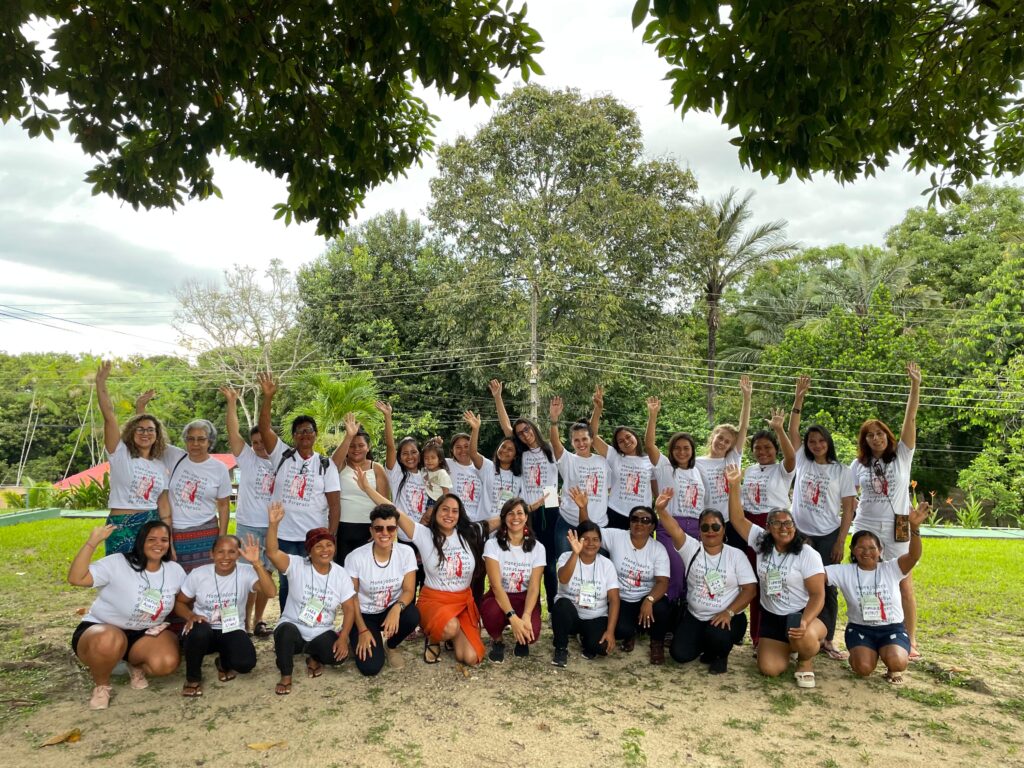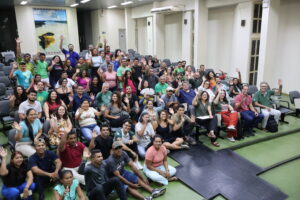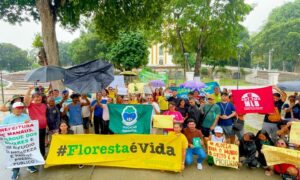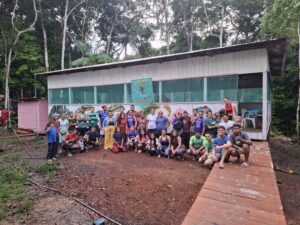After 25 years of implementing sustainable management of arapaima, women managers in Amazonas come together for the first time in a statewide collective to encourage reflection, debate and bring visibility to gender issues in the activity.
By Nathália Messina
Translated by Bruna Favaro

This June 2024, in addition to the World Environment Day, we also begin celebrations for 25 years of arapaima¹ management! Yes, there are 25 years of a history full of achievements among the daily battles of the people of the waters and forests and their allies. The first celebrations were designed by IBAMA (Brazilian Institute of the Environment and Natural Renewable Resources) and Mamirauá Sustainable Development Institute (IDSM) together with the Coletivo do Pirarucu, of which Instituto Juruá (IJ) is a member.
In the midst of this historic journey, we notice a struggle that has been emerging in recent years, echoed by the voices, hands and hearts of women who manage arapaima. They often face challenges, as their work is underappreciated, but in the economic activity of arapaima management, the scenario of valuing women has been progressing. A research led by Carolina Freitas published in 2020 revealed that a community that manages arapaima has a 77% chance of paying women in fishing, but this number drops to 8% in fishing communities where there is no management. Another research done in 2022 by ASMAMJ (Association of Agroextractive Women of Mid-Juruá), Instituto Juruá and partners points out that 38% of women and 38% of extractivist men in Mid-Juruá completely disagree with the statement that both genders have equal skills and capabilities to develop activities linked to fish. However, the same research shows that women are significantly present in almost all areas of the fishing chain, including the stage of collecting the fish from the water, and more significantly, in the stage of processing the collected fish. In other words, it is not that women do not participate or are skilled in fishing; they just aren’t recognized for it.
In view of these and other studies, we understand that the shared management of fishing resources, focused on arapaima management, represents an important lever for the empowerment of women in traditional communities in the Amazon.
In this historical context of more than two decades of struggle and recognition Coletivo do Pirarucu — which brings together different profiles and organizations to debate important management issues — formed a working group (GT) in November 2023, called GT Gênero, Juventudes e Intersecções (Gender, Youth and Intersections), aiming to give visibility to diversity in management, with a focus on women, youth and other invisible social groups.
The GT’s first strategic action focused efforts on the women’s group, through the “Meeting of Women Managers of Arapaima: Strengthening Identities and Networks”, held on June 8ᵗʰ and 9ᵗʰ in Manaus (AM), as the opening of the 11ᵗʰ Meeting of the Coletivo do Pirarucu, from June10ᵗʰ to 12ᵗʰ, which was part of the “Seminar on Community Surveillance and inspection in the arapaima management areas in Amazonas” and culminated in the celebrations of 25 years of management in Amazonas, from June13ᵗʰ to 14ᵗʰ. Some women managers participated from start to finish of all events.
With 35 women present, 1 child and 2 men, from 9 different territories² in Amazonas, 10 grassroots organizations and 9 partner organizations, the meeting had a rich program, which allowed for an intense process of learning, empowerment, exchange of experiences, creation and consolidation of bonds. “I am full of expectations, in the certainty that the women managers have a collective that can look out for each other and help with empowerment to create a future that can bring appreciation to the work of all of us, women and young people”, said Vânia da Silva de Souza, from the Japurá Community, Médio Purus, interviewed by Maria Cunha, local communicator from Instituto Juruá.
In addition to the dynamics of integration, reception and promotion of confidence for oratory and debate practices, one of the meeting’s activities addressed a participatory methodology on what constitutes community empowerment and disempowerment, which was adapted by Ana Luiza Violato Espada, from the United States Forest Service, during her doctorate and adapted again to the context of women who manage arapaima, in line with the GT. From this, it was also possible to identify the perceptions of the identities of women who handle arapaima and the gender roles that, in practice, have been assigned in this chain.
Another highlight of the program was the lecture by Prof. Dr. Edna Alencar (UFPA – Federal University of Pará and IDSM) entitled “Artisanal fisherwomen and the social management of fishing resources in the Amazon: income, environmental conservation and resilience”, which brought sociodemographic data from 192 fisherwomen. Furthermore, there were other research done by IJ and by experts mentioned, which present questions about the historical invisibility of women’s work in fishing, seeking to discuss barriers that prevent gender equality, in addition to topics such as procedural and distributive justice/equity in access fishing resources, decision-making spaces and income in the context of management, among other points.
“I am leaving fully fueled with knowledge, very certain that women can make a big difference in their territories and I want to pass on to them that we can occupy larger spaces and become stronger”, said Kamelice Paumari, from Indigenous Association of the People of Water (AIPA), Paumari Indigenous Land on the Tapauá River, in an interview with Maria Cunha.
The meeting also brought recreational activities, such as movies, exchange of souvenirs from the place of origin and the Dragon Dreaming methodology of the circle of dreams, called Sonhos Coletivos in the event, which contributed for thinking about gender and youth issues in the agendas and activities of Coletivo do Pirarucu.
As a result, the GT will continue to meet monthly and remotely to work on its strategies and actions to Coletivo do Pirarucu, in search of gender equity in the management of arapaima. The initial focus will be on valuing women and, later, action directed towards youth and other gender identities.
“I see myself now fully empowered to face the challenges I face in my territory, in my community, and in the management of arapaima, as I am a woman, practically alone representing the female work in this chain in my community. (…) I really liked it, and I believe that this GT Gênero, Juventudes e Intersecções is the missing voice for women managers to occupy their rightful space (…)!” Ivaneide Souza Lima, from Botafogo Community, RESEX Baixo Juruá, in an interview with Maria Cunha.
The meeting was organized by Coletivo do Pirarucu, through the GT Gênero, Juventudes e Interseções, and had the support of the United States Forest Service (USFS) and the United States Agency for International Development (USAID), which already operates in supporting and strengthening value chains and people in the Amazon for more than a decade.
¹Also known as pirarucu in Brazilian Portuguese.
²Territories present: 1 – Baixo Rio Negro (RESEX Unini); 2 – Baixo Juruá (RESEX BJ); 3 – Médio Juruá (RESEX MJ, RDS Uacari, Carauari Fishing Agreement); 4 – Médio Purus (RESEX MP); 5 – Médio Purus (TIs Paumari); 6 – Medium Solimões; 7 – Alto Solimões (Jutaí); 8 – Alto Solimões (TI Uati Paraná); 9 – Médio Javari (TI Vale do Javari). The 9 territories mentioned are delineated beyond the understanding of the geographic space, the administrative-political limits, the river basin or sub-basin. Territory is understood here in a symbolic and biocultural context, shaped by social groups that identify with their land and their place of belonging.






